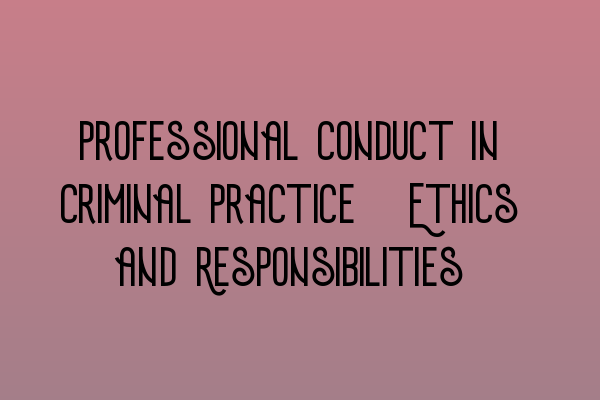Professional Conduct in Criminal Practice: Ethics and Responsibilities
When it comes to criminal law practice, professional conduct and ethical responsibilities play a crucial role in upholding the integrity of the legal profession. Whether you are an aspiring criminal lawyer or a seasoned practitioner, it is essential to adhere to the highest professional standards to maintain the trust and confidence of your clients, the court, and the general public.
Understanding Professional Conduct
Professional conduct refers to the ethical principles, rules, and behaviors that lawyers must follow in their practice. As a criminal lawyer, you have a responsibility to act in the best interests of your clients while upholding the principles of justice and fairness. This means providing competent representation, maintaining client confidentiality, and avoiding conflicts of interest.
One of the fundamental aspects of professional conduct is the duty of candor. This means being honest and transparent with your clients, the court, and other parties involved. It is crucial to present accurate information and present all relevant legal options to your clients, even if it may not be in their favor. By doing so, you promote fairness and ensure that justice is served.
Responsibilities in Criminal Practice
As a criminal lawyer, you have a range of responsibilities that go beyond representing your clients in court. These include:
- Adhering to the Solicitors Regulation Authority (SRA) Code of Conduct
- Keeping abreast of changes and developments in criminal law
- Properly managing your caseload
- Communicating effectively with clients, court personnel, and other professionals
- Maintaining client confidentiality
- Avoiding conflicts of interest
- Acting with integrity and honesty
To ensure professional competence, it is essential to engage in continuous professional development. By staying up to date with changes in legislation, attending relevant training courses, and participating in legal conferences, you can enhance your knowledge and skills, providing the best possible representation for your clients.
Importance of Ethics in Criminal Practice
Ethics form the foundation of the legal profession, and their importance in criminal practice cannot be overstated. Upholding ethical standards is essential to maintain public trust and confidence in the criminal justice system.
One way to ensure adherence to ethical principles is by seeking guidance from professional bodies and regulatory authorities. For example, the Solicitors Regulation Authority provides comprehensive guidance on professional conduct, and it is important to be familiar with their rules and regulations.
Integrity, confidentiality, and fairness are key principles that should guide every decision and action you take as a criminal lawyer. By acting ethically, you not only uphold the credibility of the legal profession but also contribute to the effective functioning of the criminal justice system.
Conclusion
Professional conduct and ethical responsibilities are at the core of criminal law practice. By adhering to the highest standards of professional conduct, you not only fulfill your obligations to your clients but also contribute to the fairness and integrity of the criminal justice system.
To enhance your understanding of professional conduct and ethics in criminal practice, consider enrolling in SQE 1 and SQE 2 preparation courses. These courses will equip you with the necessary knowledge and skills to excel in your legal career. Additionally, be sure to stay updated on the latest SRA SQE exam dates to plan your preparation effectively.
For further practice and assessment, you can access SQE 1 practice exam questions and SQE 1 practice mocks FLK1 and FLK2. These resources will help you evaluate your knowledge and identify areas for improvement.
Remember, as a criminal lawyer, your conduct and ethics have a direct impact on the lives of your clients and the overall justice system. Commit to maintaining the highest standards of professionalism, and you will forge a successful and rewarding career in criminal law.
